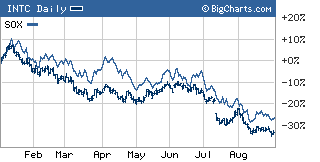NEW YORK (CNN/Money) -
Intel slashed its third quarter sales forecast Thursday, confirming investors' fears about weakening demand for technology products.
The company also lowered its closely watched gross margins outlook. Shares plummeted after-hours on the news.
Intel, the world's largest maker of chips used in personal computers and servers, said it now expects sales for the quarter, which ends in September, to come in at a range of $8.3 billion to $8.6 billion. The $8.45 billion midpoint of this range is much lower than the consensus estimate of $8.9 billion. Intel had said in July that it expected sales to be between $8.6 billion and $9.2 billion.
The company added that gross margins, which measure how profitable a company is after subtracting the cost of sales, should be about 58 percent, lower than the company's previous guidance of about 60 percent.
Intel added that gross margins for the year would be about 58 percent to 60 percent. The company had said in July that margins for the year should be about 60 percent.
During a conference call with analysts, Intel chief financial officer Andy Bryant referred to the slowdown in demand as being "modest in scope" and taking place across all geographies. He added that the shortfall was mainly due to sluggish retail sales of computers as opposed to a slowdown on the corporate side.
Shares of Intel (INTC: Research, Estimates) plunged nearly 7.5 percent after-hours, according to INET, after rising nearly 1 percent, to $21.63, in regular trading on the Nasdaq Thursday.
The stock, which more than doubled in 2003, has been the worst performer in the Dow Jones Industrial Average this year. Shares have plunged 32 percent due to fears that Intel's best levels of growth are behind it, i.e. the semiconductor cycle is close to peaking.
 |
|
| It has been a tough year on Wall Street for Intel and other semiconductor companies. |
As a result of Intel's lackluster guidance, shares of several chip companies also sank after hours, which does not bode well for Friday.
Texas Instruments (TXN: Research, Estimates) was down more than 2 percent while Advanced Micro Devices (AMD: Research, Estimates) fell 3.5 percent.
Chip equipment firms, which count Intel as a top customer, were also down sharply. Applied Materials (AMAT: Research, Estimates) and Novellus Systems (NVLS: Research, Estimates) each fell nearly 3 percent.
PC makers Dell (DELL: Research, Estimates) and Hewlett-Packard (HPQ: Research, Estimates) each dipped more than 1 percent.
Abandon chip?
In a written statement, Intel said that demand for its so-called architecture products -- microprocessors, motherboards and chipsets used in personal computers -- was lower than expected. Intel also said that demand for communications chips was weaker than anticipated due to lower-than-expected shipments of flash memory chips, a key component in cell phones.
Cody Acree, an analyst with Legg Mason, said Intel's comments about weak demand for PCs are a bit of a surprise since PC leaders Dell, Hewlett-Packard and IBM all indicated in their recent quarterly updates that sales of computers, particularly notebooks, were fairly brisk.
"There is a certain amount of disconnect here," Acree said.
| Related stories
|

|
|
|
|
Intel typically reports a sequential sales increase of about 8 percent to 9 percent in the third quarter, owing to a pickup in demand during the critical back-to-school shopping season. But the $8.45 billion midpoint represents only a 5 percent sales increase.
That could mean that the back-to-school shopping season sales of PCs and other high-tech gadgets was not nearly as strong as investors had hoped and could cast doubts on how robust sales will be during the holidays as well.
In addition, Intel has reported two consecutive quarters of substantially larger inventories. As a result, Wall Street will now wonder about whether the company will need to take a charge to write off excess chips or if the company will resort to significant price cuts to clear out inventory.
"This is disappointing. It sounds like a combination of both weaker demand for PCs and the continuing impact of some of these inventory excesses hurt them," said Krishna Shankar, an analyst with JMP Securities. "All in all, it's a pessimistic near-term outlook."
However, Tai Nguyen, an analyst with Susquehanna Financial Group, said that it sounded like Intel's problems are mainly due to the inventory buildup and not a major softening of demand. That could mean that other chip companies like Texas Instruments, which will give its own mid-quarter update next week, will not have to lower sales targets as well.
"I would say at this time that it's more of an Intel specific issue," said Nguyen, adding that it probably will take Intel another quarter to completely rid itself of extra inventory.
JMP Securities' Shankar owns shares of Intel but his firm has no banking ties to the company. Other analysts quoted do not own shares of Intel and their firms have no banking relationships with the company.

|

